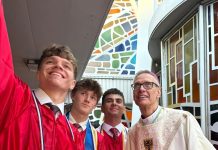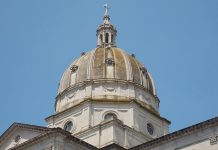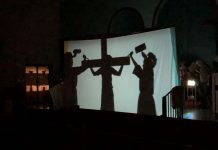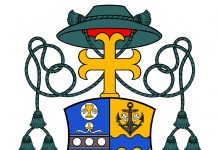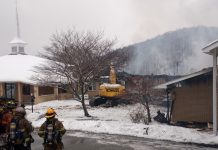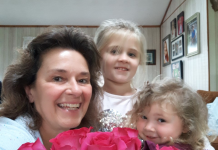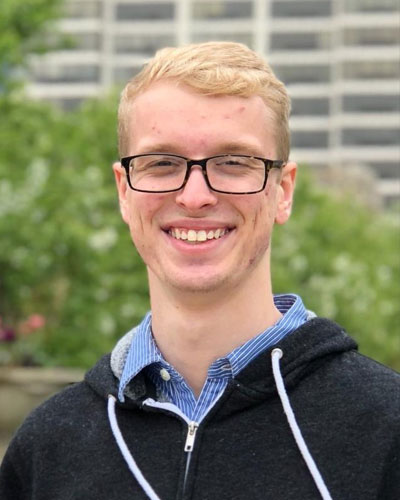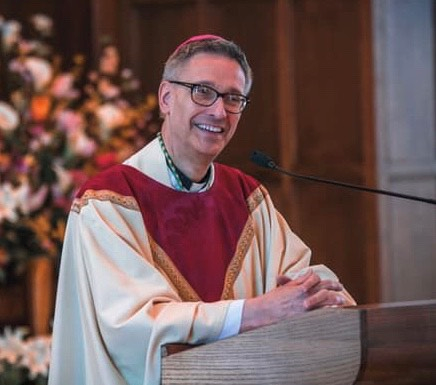Column by Justin Kirkland
One aspect of my life, for which I am forever grateful, is my mother’s decision to send me through the Catholic school system. What she might not have realized, and what I have only recently started to understand, is the impact this education would have on my life – more than simply preparing me for college or getting a good job.
Whether we know it or not, the majority of kids and teenagers have an unceasing wave of questions continuously bombarding their minds. From the simplest of questions like “why is the sky blue?” to the deepest longings of the human heart – “why am I here and do I even matter?” These are questions that normally can’t be memorized and written on a test. I was no different when I was a teenager, and when I was finally able to be alone with my thoughts, these existential questions overtook everything. The problem, however, is that I couldn’t just Google the answer, and the majority of adults that I asked gave me unsatisfying and shallow responses like “Oh you’ll figure it out, don’t worry” or “This is just how it is,” which frustrated me all the more.
The first time that I can remember being shocked that someone would go deeper into these conundrums was in a Religion class in high school. The teacher, instead of pushing hard questions away, actually tried to give answers. Whether they were what I wanted to hear or not, he tried to authentically teach the truths of the Catholic faith, and if he didn’t have the answer, he would find it or give me the resources to find it myself. This would then be the beginning of my ascent to the spiritual life and the first glimpse I had into the rich intellectual life in which the Catholic Church is able to offer.
Through undergraduate study in Theology, long hours of philosophizing, discussions with intellectually curious friends, and being with people who just wanted more from life then the modern ‘keeping up with the Jones’ materialistic mentality, I began to learn why academia in the Catholic tradition is more than an added Religion class, more than memorizing answers on a test, or getting a good grade, or preparing for college to get a good job. Instead, the Catholic tradition looks to teach a holistic view of the human person. Through the study of multiple disciplines, in accordance with Theology and Philosophy, which incorporates and upholds all disciplines, a person is able to more fully receive and experience the humanity which only God is able to provide, which in turn creates a perspective that is indicative of the Christian life.
This is why some of the most distinguished scholastics who built western civilization and created the greatest works of human history saw this intellectual tradition as the springboard to understanding themselves and the world around them, turning them from mere peasants to great saints. Instead of buying into the mentality of education for some sort of monetary success, those who came before us looked at learning in order to find answers to the deep longings within the human heart. To learn about the natural sciences was to learn about the Creator, to learn about the human person was a way to learn of the Incarnation, and to cultivate the arts was a way in which the beauty and mystery of the spiritual life could be brought forth.
Though these thoughts have been conveyed more eloquently then I am able to here, the main thought in all of this is that a Catholic school should not be looked at as just another school among many, but instead should be looked as a greater way to cultivate the human person. By investing in Catholic education and our holistic approach to the human person, we invest in more than just a school building, but instead invest in the future of our Catholic identity, the Church Herself, academia, and our rich tradition. Investing in our Catholic schools lays a claim for God and His Kingdom more than ourselves and our own legacy.
Justin Kirkland has a Bachelor’s degree in Theology from Franciscan University of Steubenville and is pursuing a Master’s degree in Theology. He is employed in the Diocese of Altoona-Johnstown Offices of Communications, Human Resources, and Youth Protection.


